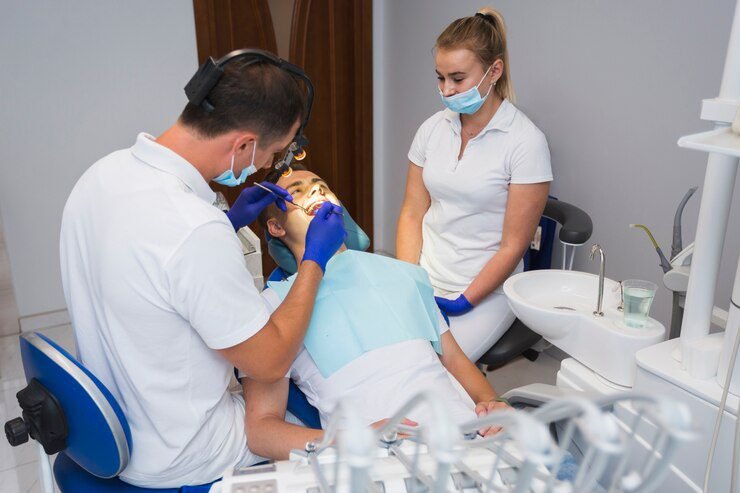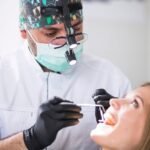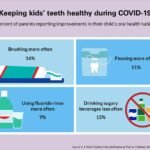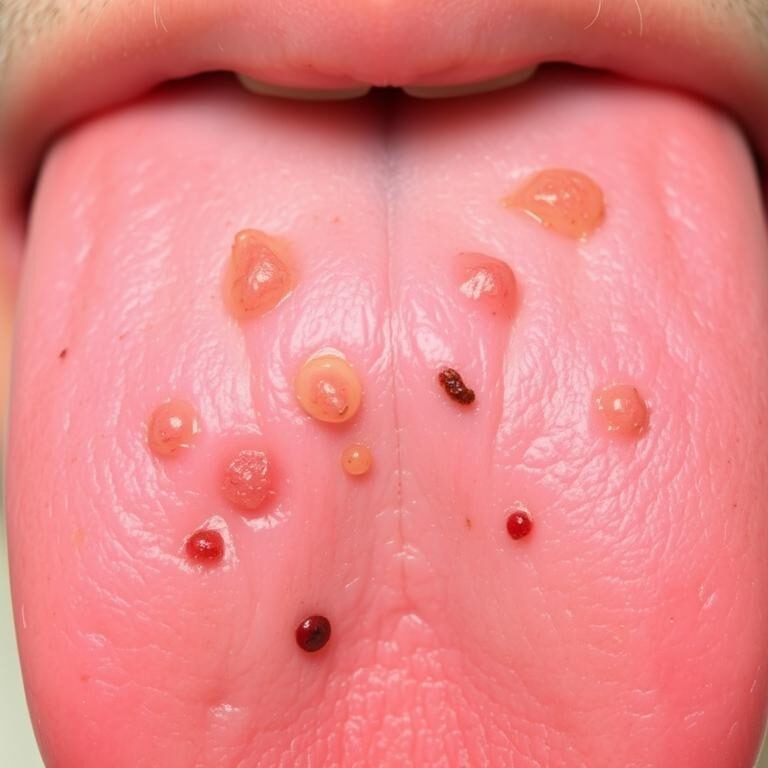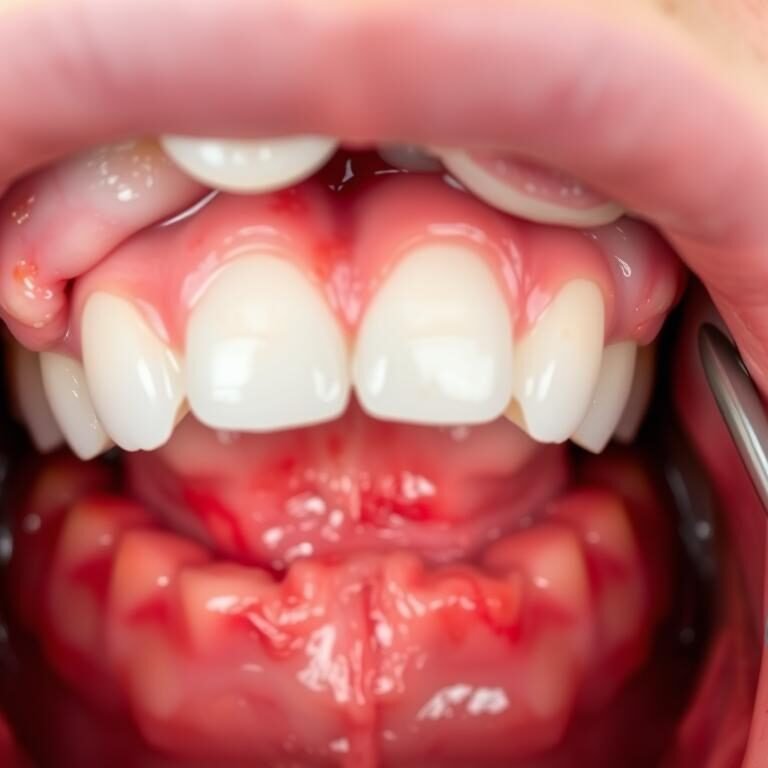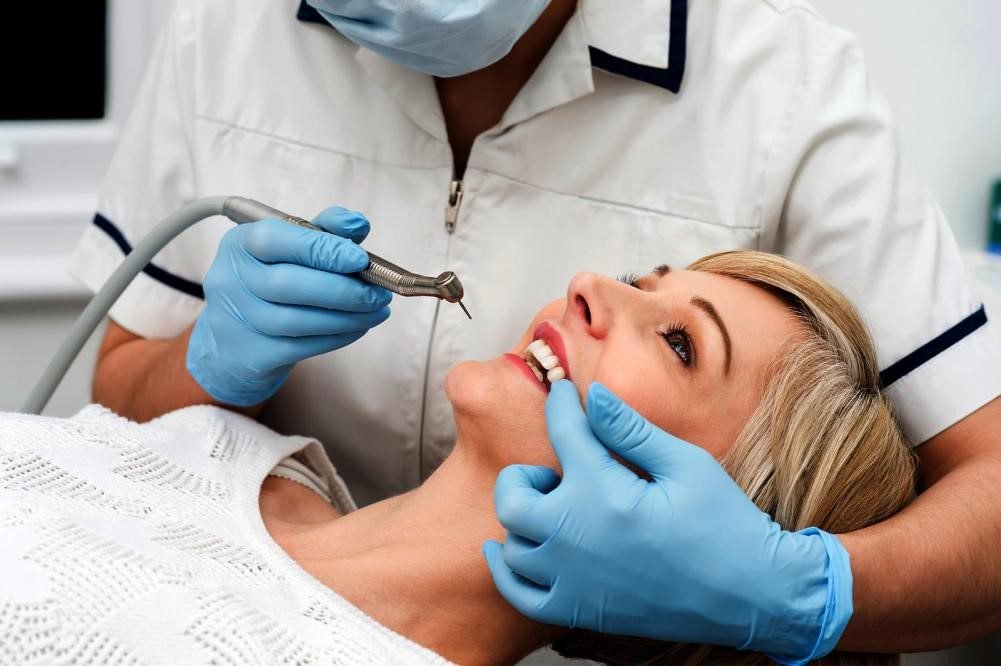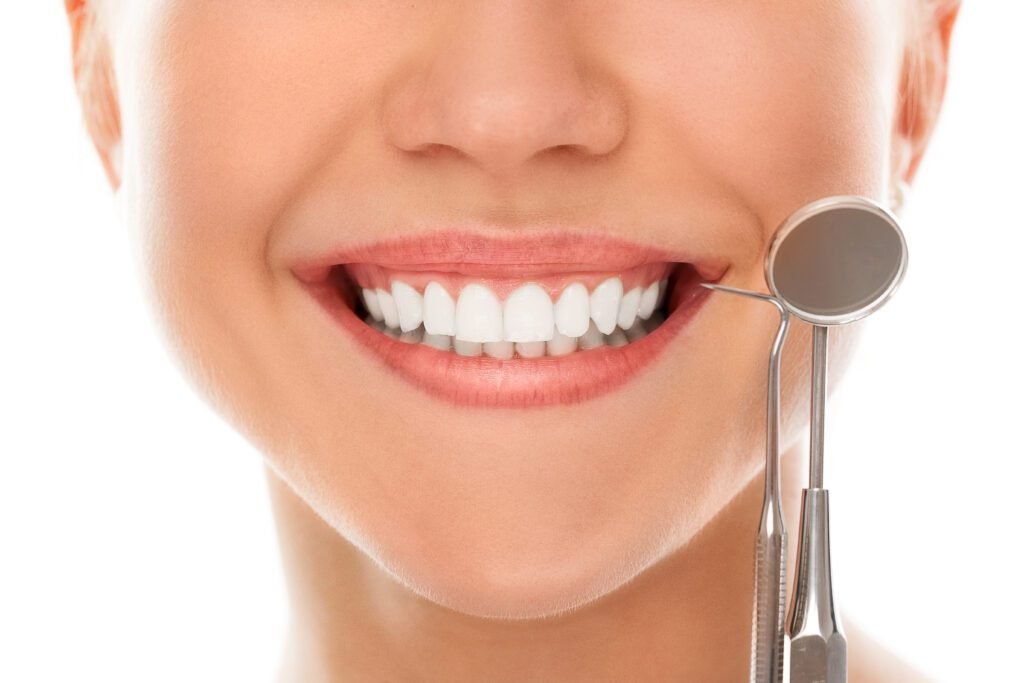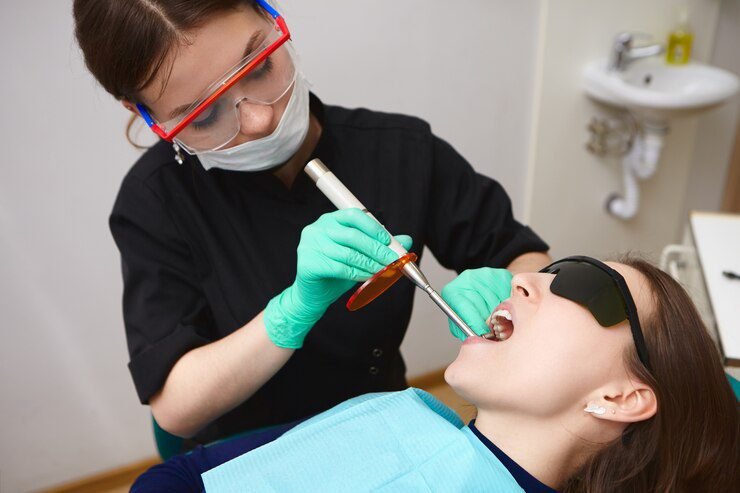Table of Contents
Signs and Symptoms of Dental Problems During COVID-19

Dental problems can be concerning at any time, but during the COVID-19 pandemic, it is important to be vigilant about any signs or symptoms that may arise. While some dental issues may be minor and manageable at home, others may require prompt attention from a dental professional. Being aware of the common signs and symptoms of dental problems can help individuals seek appropriate care and prevent further complications.
One of the most common signs of dental problems is toothache. This persistent pain can be sharp or dull and may be accompanied by sensitivity to hot or cold temperatures. Other signs to look out for include swollen or tender gums, bleeding gums while brushing or flossing, and bad breath that does not improve with regular oral hygiene practices. Additionally, tooth sensitivity to sweet or acidic foods, loose teeth, and jaw pain or stiffness can also indicate underlying dental issues. It is crucial to address these symptoms promptly to prevent potential complications and ensure optimal oral health.
During these challenging times, it is important to stay mindful of our dental health. Maintaining good oral hygiene practices, such as brushing twice a day with fluoride toothpaste, flossing daily, and using mouthwash, can help reduce the risk of dental problems. It is also vital to maintain a balanced diet, limiting sugary and acidic foods and beverages that can contribute to tooth decay. Regular dental check-ups and cleanings may have been delayed due to the pandemic, but it is essential to reschedule these appointments as soon as it is safe to do so. By being aware of the signs and symptoms of dental problems and practicing preventive measures, individuals can strive to maintain their oral health during these challenging times.
Understanding the Impact of COVID-19 on Dental Health
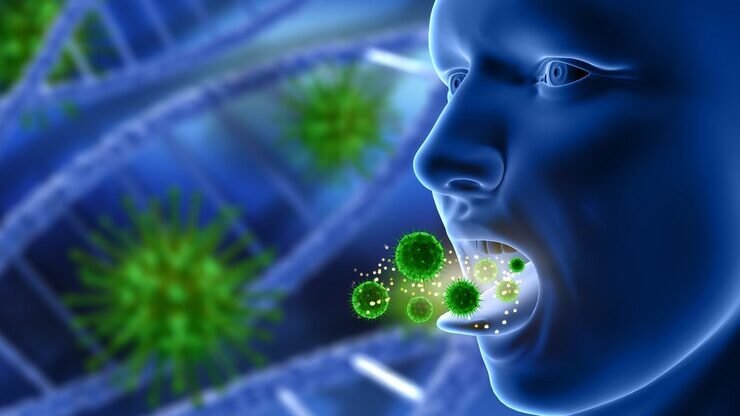
The COVID-19 pandemic has had a significant impact on various aspects of our lives, and dental health is no exception. With the implementation of social distancing measures and the temporary closure of many dental clinics, individuals have faced challenges in accessing timely dental care. As a result, there has been an increase in dental problems, ranging from minor issues such as tooth sensitivity to more severe conditions like tooth decay and gum disease.
One of the main factors contributing to this impact is the postponement of routine dental check-ups and cleanings. These appointments are crucial for detecting any early signs of dental problems and preventing them from worsening. Delayed or missed appointments can lead to untreated dental issues and potentially result in more invasive and costly treatments in the future. Additionally, the stress and anxiety caused by the pandemic can also have a negative impact on oral health. Many individuals may find themselves engaging in unhealthy habits such as teeth grinding or clenching, which can damage the teeth and jaw joints.
It is important for individuals to be aware of these impacts and take preventive measures to maintain their dental health during these challenging times. Following good oral hygiene practices, such as regular brushing and flossing, can help minimize the risk of dental problems. It is also crucial to maintain a balanced diet and limit the consumption of sugary and acidic foods and beverages, as they can contribute to tooth decay. Furthermore, individuals should prioritize their mental well-being and find healthy ways to manage stress, as this can have a direct impact on oral health. By taking these proactive steps, individuals can mitigate the negative impact of COVID-19 on dental health and ensure the well-being of their smiles.
Preventive Measures to Maintain Oral Health During the Pandemic
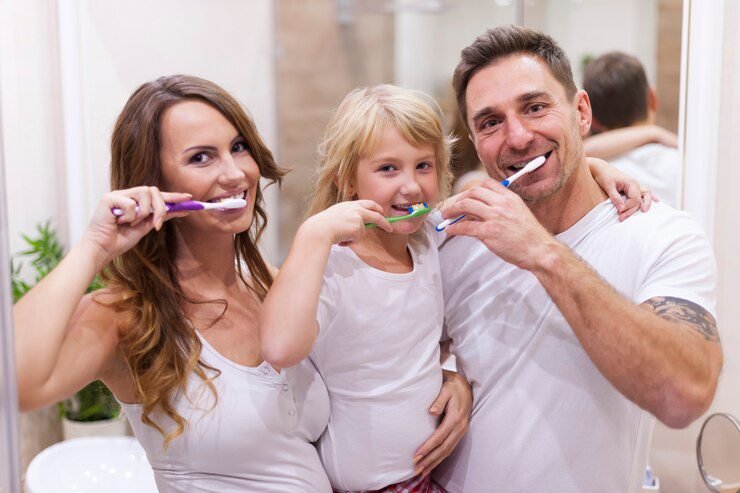
Maintaining good oral health during the COVID-19 pandemic is essential to preserving overall wellbeing. By adopting preventive measures, individuals can minimize the risk of dental problems and ensure their oral hygiene remains optimal.
Regular and thorough oral hygiene practices should be the foundation of any preventive measures. This includes brushing teeth at least twice a day with fluoride toothpaste and using dental floss to clean between the teeth. Additionally, incorporating mouthwash into the daily routine can help to further reduce bacteria in the mouth. It’s important to remember to replace toothbrushes regularly, as worn-out bristles can be less effective in cleaning teeth and gums.
Furthermore, paying attention to diet can play a significant role in oral health. Limiting sugary foods and beverages can help prevent tooth decay and cavities. Opting for a balanced diet, rich in nutrients and minerals, can also support strong teeth and gums. Staying hydrated by drinking water throughout the day not only keeps the body nourished, but it also helps to flush out harmful bacteria in the mouth. By following these preventive measures, individuals can maintain their oral health and minimize the risk of dental problems during the pandemic.
Recognizing the Connection Between Stress and Dental Problems
Stress can have a significant impact on our overall health, and dental health is no exception. It is important to recognize the connection between stress and dental problems in order to take proactive steps in maintaining good oral health.
One common dental problem that can be exacerbated by stress is bruxism, or teeth grinding. According to the American Dental Association, stress and anxiety are major contributing factors to bruxism. The grinding and clenching of teeth can lead to various issues, such as tooth enamel wear, tooth sensitivity, jaw pain, and even headaches. It is important to be mindful of any signs of teeth grinding, such as a sore jaw or worn-down teeth, and seek professional help if needed.
In addition to bruxism, stress can also affect our oral hygiene habits. When we are stressed, we may neglect our regular oral hygiene routine, leading to an increased risk of cavities, gum disease, and other dental issues. Furthermore, stress can weaken our immune system, making us more susceptible to infections and inflammation in the mouth. It is crucial to prioritize self-care, even during stressful times, and maintain a consistent oral hygiene routine of brushing twice a day, flossing daily, and visiting the dentist regularly for check-ups and cleanings.
Common Dental Emergencies and How to Handle Them
In the midst of the COVID-19 pandemic, it is important to be prepared for various dental emergencies that may arise. While regular dental care may be limited during these times, it is crucial to know how to handle common dental emergencies to alleviate pain and prevent further complications.
One common dental emergency is a toothache. This can be caused by a variety of factors, such as tooth decay, gum disease, or even a cracked tooth. If you are experiencing a toothache, it is important to rinse your mouth with warm water and gently floss around the affected tooth to remove any food particles that may be causing the pain. Over-the-counter pain medications can also be used for temporary relief. However, it is essential to schedule an appointment with your dentist as soon as possible to address the underlying cause of the toothache.
Another common dental emergency is a knocked-out tooth. If a permanent tooth is completely knocked out, time is of the essence. It is crucial to handle the tooth carefully by holding it by the crown and avoiding touching the roots. Rinse the tooth gently with water if it is dirty, but do not scrub or remove any tissue fragments. Try to reinsert the tooth into the socket, if possible, and hold it in place with clean gauze or a clean cloth. If reinsertion is not possible, place the tooth in a container of milk or a tooth preservation solution. Contact your dentist immediately for further instructions and to increase the chances of successfully reattaching the tooth.
By being informed about common dental emergencies and knowing how to handle them, you can minimize pain, prevent further complications, and maintain your overall oral health during these challenging times. Remember, it is vital to seek professional dental care as soon as possible for any dental emergencies to ensure proper treatment and avoid long-term consequences.
Certainly! Here is a table that summarizes the most common dental emergencies and how to handle them:
| Emergency | Description |
|---|---|
| Toothache | A toothache can be caused by various factors, including tooth decay, infection, or gum problems. Rinse your mouth gently with warm water to clean the area. Use dental floss to remove any lodged food. Apply a cold compress to the outside of your mouth or cheek. |
| Knocked-out tooth | Find the tooth, hold it by the crown (the part that is usually exposed in the mouth), and rinse off the root with water if it’s dirty. Do not scrub it or remove any attached tissue fragments. If possible, try to put the tooth back in place. Make sure it’s facing the right way. Never force it into the socket. If you can’t put the tooth back into the socket, hold it in the mouth on the way to the dentist, or put it in a small container of milk or a product containing cell growth medium, such as Save-a-Tooth. |
| Broken or chipped tooth | Save any pieces. Rinse the mouth using warm water; rinse any broken pieces. If there’s bleeding, apply a piece of gauze to the area for about 10 minutes or until the bleeding stops. Apply a cold compress to the outside of the mouth, cheek, or lip near the broken/ chipped tooth to keep any swelling down and relieve pain. |
| Lost dental filling or crown | Crowns and fillings can become dislodged for a variety of reasons. If this occurs, seek dental care immediately to avoid further damage or infection. Teeth require a proper seal and support to prevent oral bacteria and to protect against the natural forces from chewing1 |
| Abscessed tooth | An abscessed tooth is an infection at the root of a tooth or between the gum and a tooth. Rinse your mouth with a mild saltwater solution. Use a cold compress to relieve pain and swelling. |
| Object lodged between teeth | Try to gently remove the object with dental floss. Never use a sharp instrument to remove any object that is stuck between your teeth. If you can’t dislodge the object with dental floss, contact your dentist1 |
| Broken orthodontic appliance | If a wire breaks or sticks out, use a pencil eraser to push the wire so that it is flat against the tooth. If this is not possible, cover the end of the wire with a small piece of orthodontic wax, a small cotton ball, or a piece of gauze until you can see your orthodontist1 |
| Tongue or lip injury | Clean the area gently with a cloth and apply a cold compress to reduce swelling. If the bleeding doesn’t stop, go to a hospital emergency room immediately1 |
The Role of Tele-dentistry in Diagnosing and Treating Dental Issues
Tele-dentistry has emerged as a valuable tool in diagnosing and treating dental issues during the COVID-19 pandemic. With the restrictions on in-person dental visits and the need to minimize physical contact, tele-dentistry provides a convenient and safe alternative for patients to receive oral healthcare. By utilizing video conferencing technology, dentists can remotely assess patients’ dental conditions, provide consultations, and even offer treatment recommendations.
One of the key advantages of tele-dentistry is its ability to reach individuals in remote or underserved areas who may have limited access to dental care. Through virtual consultations, patients can connect with dental professionals regardless of their geographical location, ensuring that crucial dental services are accessible to all. This is particularly beneficial for individuals in rural areas, where the nearest dental clinic may be hours away.
Moreover, tele-dentistry allows for early detection and intervention, reducing the risk of dental problems worsening over time. Dentists can visually examine a patient’s mouth, identify any oral health concerns, and guide them on necessary steps to address the issues. This proactive approach enables timely intervention, preventing minor dental problems from escalating into major complications that might require more extensive treatments. Additionally, tele-dentistry can aid in the management of chronic conditions such as gum disease or temporomandibular joint (TMJ) disorders, providing ongoing monitoring and guidance to patients.
However, it is important to note that tele-dentistry has its limitations. While it can serve as an initial assessment tool and provide remote guidance, certain dental procedures still require in-person visits for proper diagnosis and treatment. Complex oral surgeries, orthodontic adjustments, and certain restorative treatments may necessitate physical examinations and interactions. Therefore, tele-dentistry should be seen as a complementary approach rather than a complete substitute for traditional dental care.
In conclusion, tele-dentistry plays a significant role in diagnosing and treating dental issues during the COVID-19 pandemic. Its ability to bridge the gap between dental professionals and patients, especially those in remote areas, ensures access to essential oral healthcare services. By leveraging video conferencing technology, dentists can perform virtual consultations, offer guidance, and monitor patients’ oral health. While tele-dentistry has its limitations, its use as a supportive tool proves invaluable in maintaining dental health amidst the challenges of the current situation.
How to Manage Dental Anxiety and Fear during COVID-19
Dental anxiety and fear can be overwhelming, especially during these uncertain times of the COVID-19 pandemic. It is important to address these fears and find effective ways to manage them in order to prioritize your dental health. One of the key steps in managing dental anxiety is to have open and honest communication with your dentist. By expressing your fears and concerns, your dentist can better understand your needs and provide personalized care to help ease your anxiety.
Additionally, it may be helpful to educate yourself about the safety measures being implemented in dental practices during the pandemic. Dentists are following strict infection control protocols, such as wearing personal protective equipment and maintaining proper sanitation procedures. Being aware of these precautions can help alleviate any fears you may have about visiting the dentist.
Importance of Proper Oral Hygiene Practices at Home
Maintaining proper oral hygiene practices at home is essential for a healthy smile, especially during the COVID-19 pandemic. With limited access to dental clinics and the importance of reducing the risk of viral transmission, it is more important than ever to take charge of your oral health. By implementing a consistent oral hygiene routine, you can prevent dental problems and maintain a bright and healthy smile.
Brushing your teeth at least twice a day with a soft-bristled toothbrush and fluoride toothpaste is the cornerstone of good oral hygiene. It helps remove plaque, bacteria, and food particles that can lead to tooth decay and gum disease. Don’t forget to brush your tongue as well, as it harbors bacteria that can contribute to bad breath. In addition to brushing, flossing daily is vital, as it reaches areas between the teeth where a toothbrush cannot reach. This helps remove plaque and debris, reducing the risk of cavities and gum inflammation.
Additionally, incorporating mouthwash into your routine can provide an extra layer of protection against bacteria. Choose an alcohol-free mouthwash that contains fluoride to strengthen your tooth enamel and fight cavities. Alongside these practices, maintaining a healthy diet low in sugars and acidic foods can also contribute to better oral health. Remember, preventive measures at home play a crucial role in preserving your dental well-being, even during challenging times like the COVID-19 pandemic.
Addressing the Challenges of Accessing Dental Care during the Pandemic
Accessing dental care during the COVID-19 pandemic has posed several challenges for individuals seeking necessary treatment. With many dental clinics implementing restrictions and safety protocols, the process of scheduling appointments and receiving care has become more complex. Patients may face delays in accessing dental services due to reduced clinic capacity, limited appointment availability, and prioritization of urgent cases.
Additionally, some individuals may experience financial difficulties, making it harder to afford dental treatments. As job losses and economic uncertainty continue, patients may have to prioritize their spending, resulting in postponed or neglected dental care. This can lead to worsening dental conditions and longer-term complications if left untreated. It is crucial for individuals to explore available options, such as dental insurance coverage, payment plans, or clinics with reduced-cost services, to ensure their oral health needs are addressed timely and effectively.
The Role of Diet and Nutrition in Promoting Dental Health
Maintaining a healthy diet and good nutrition is essential for promoting dental health. The foods and beverages we consume can have a significant impact on the strength of our teeth and gums. A well-rounded diet that includes essential nutrients can help prevent dental problems such as tooth decay and gum disease.
Calcium is a key mineral for dental health, as it plays a vital role in strengthening tooth enamel. Foods rich in calcium, such as dairy products, leafy greens, and almonds, can help keep your teeth strong and healthy. Vitamin D is also crucial, as it aids in the absorption of calcium. Sources of vitamin D include fortified milk, fatty fish, and sunlight exposure.
Another important nutrient for dental health is vitamin C, which supports gum health and helps prevent gum disease. Citrus fruits, strawberries, and bell peppers are excellent sources of vitamin C. Additionally, antioxidants found in fruits and vegetables help fight inflammation and promote healthy gums. Including a variety of colorful fruits and veggies in your diet can provide these beneficial antioxidants.
Incorporating these nutrient-rich foods into your diet can greatly contribute to promoting dental health. However, it’s important to note that a balanced diet should be accompanied by proper oral hygiene practices such as regular brushing, flossing, and dental check-ups. By combining a healthy diet with good oral hygiene habits, you can help ensure the overall well-being of your teeth and gums.
Effective Measures to Alleviate Dental Pain at Home
To alleviate dental pain at home, there are several effective measures you can take to temporarily reduce discomfort and promote healing. One of the first steps is to gently rinse your mouth with warm saltwater. This can help to soothe any inflammation and provide temporary relief. Simply dissolve half a teaspoon of salt in 8 ounces of warm water and swish it around your mouth for about 30 seconds before spitting it out.
Another home remedy that may help to alleviate dental pain is the application of a cold compress on the affected area. This can help to numb the area and reduce swelling. Simply wrap a bag of ice or a cold pack in a thin cloth and apply it to the outside of your cheek for about 15 minutes at a time. Be sure to take breaks in between applications to avoid damaging your skin.
Additionally, over-the-counter pain relievers such as acetaminophen or ibuprofen can be used to temporarily alleviate dental pain. However, it is important to follow the instructions on the packaging and consult with a healthcare professional before taking any medication, especially if you have any underlying health conditions or are taking other medications.
While these measures may provide temporary relief, it is crucial to seek professional dental care as soon as possible. Dental pain can be a sign of underlying issues that require professional treatment. Although you may be able to manage the pain at home temporarily, it is essential to address the root cause and prevent further complications.
Understanding the Long-Term Consequences of Delaying Dental Treatment
Delaying dental treatment can have significant long-term consequences on oral health. Without timely intervention, dental problems can worsen and lead to more severe issues. For example, a cavity left untreated can progress to an infection in the tooth root, resulting in the need for a root canal or even tooth extraction. Similarly, gum disease that is not addressed promptly can cause gum recession, bone loss, and eventually tooth loss.
Moreover, delaying dental treatment can exacerbate existing dental conditions. For individuals already dealing with chronic dental issues such as temporomandibular joint disorders or bruxism, postponing treatment can prolong discomfort and further damage the teeth and jaw. This can have a detrimental impact on overall quality of life, affecting activities such as eating, speaking, and even sleeping.
It is important to understand that dental problems do not resolve on their own. Seeking timely professional dental care plays a crucial role in preventing the progression of dental issues and reducing the risk of complications. Regular dental check-ups and cleanings not only help in early detection of problems but also enable dentists to provide appropriate treatment before the condition worsens. Therefore, it is advisable to prioritize dental care and address any dental concerns promptly, even during uncertain times like the COVID-19 pandemic.
Seeking Professional Dental Care Safely during the COVID-19 Pandemic
During the COVID-19 pandemic, it is understandable that many people may have concerns about seeking professional dental care. However, it is crucial to prioritize your oral health and not neglect any dental issues that may arise. Fortunately, there are measures in place to ensure the safety of patients and dental professionals.
Dental clinics have implemented strict infection control protocols to minimize the risk of COVID-19 transmission. These include screening patients for symptoms, regularly disinfecting surfaces, providing hand hygiene stations, and maintaining social distancing in waiting areas. Additionally, dental staff are equipped with appropriate personal protective equipment (PPE) such as masks, gloves, and face shields to protect both themselves and patients. By adhering to these safety measures, you can seek professional dental care with peace of mind knowing that every precaution is being taken to ensure your safety.
When it comes to dental emergencies, it is important to remember that prompt treatment is essential to prevent further complications. Delaying treatment may result in worsening pain, infection, or even the need for more extensive procedures in the future. If you are experiencing severe tooth pain, a broken tooth, or any other urgent dental issue, it is crucial to contact your dentist as soon as possible. Most dental clinics are equipped to handle emergencies and will do their best to provide the necessary care while prioritizing your safety. Remember, seeking professional dental care promptly can help alleviate pain and prevent potential long-term consequences.
Is it safe to visit a dentist during the COVID-19 pandemic?
Yes, it is safe to visit a dentist during the COVID-19 pandemic as long as the dental clinic follows strict infection control protocols recommended by health authorities.
What precautions should I take when visiting a dentist during the pandemic?
When visiting a dentist, it is important to wear a mask, practice social distancing, and follow proper hand hygiene. Additionally, you may be asked to complete a health screening or have your temperature checked before entering the clinic.
Can dental problems be a symptom of COVID-19?
While dental problems are not commonly associated with COVID-19, some individuals may experience oral symptoms such as mouth sores or dry mouth. It is important to consult a dentist if you experience any unusual oral symptoms.
How can stress affect dental health during the pandemic?
Stress can contribute to teeth grinding, jaw clenching, and poor oral hygiene habits, which can in turn lead to dental problems. It is crucial to manage stress through relaxation techniques and seeking support if needed.
Can dental emergencies be treated through tele-dentistry?
Tele-dentistry can be used to diagnose and provide advice for dental emergencies, but certain procedures may still require an in-person visit to the dentist for proper treatment.
How can I effectively manage dental anxiety and fear during the pandemic?
Communicate your concerns with your dentist, who can provide reassurance and support. They may also offer relaxation techniques or sedation options to help ease anxiety during dental visits.
What are some effective measures to alleviate dental pain at home?
Temporarily alleviate dental pain at home by rinsing your mouth with warm saltwater, applying a cold compress to the affected area, and taking over-the-counter pain medication as directed.
What are the long-term consequences of delaying dental treatment during the pandemic?
Delaying dental treatment can lead to worsening dental conditions, increased pain, and potential complications that may require more extensive and costly treatment in the future.
How can I access dental care if it is challenging during the pandemic?
If accessing dental care is challenging, consider reaching out to your dentist to discuss potential options such as tele-dentistry or referral to a dental clinic that can accommodate your needs.
How does diet and nutrition affect dental health during the pandemic?
A healthy diet that is low in sugary and acidic foods can help maintain good oral health. Proper nutrition supports strong teeth and gums, while avoiding excessive snacking can reduce the risk of tooth decay.

